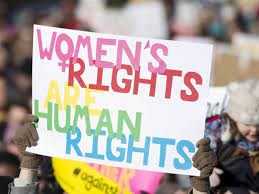Women's rights refer
to the social, economic, and political rights that women are entitled to in
society. Over the years, there have been significant changes in the way women
are treated, with women's rights movements playing a crucial role in the push
for gender equality. Despite this progress, there are still challenges that
women face, and it is important to continue advocating for women's rights to
ensure equality for all.
One
of the most critical issues that women face is gender-based violence, including
domestic violence, sexual assault, and harassment. Women are often victims of
violence because of their gender, and this can have a significant impact on
their physical and mental health. It is essential to raise awareness of
gender-based violence and to provide resources and support to victims.
Another
issue that women face is the gender pay gap. Women are often paid less than men
for doing the same job, and this can result in financial inequality. It is
crucial to work towards closing the gender pay gap by advocating for equal pay
for women and implementing policies that promote pay equity.
In
addition to the gender pay gap, women also face challenges in the workforce,
such as discrimination and harassment. Women are often excluded from certain
fields, and they may face obstacles in advancing in their careers. It is
important to work towards creating a more inclusive work environment that
supports the professional development of women.
Reproductive
rights are also a critical issue for women's rights. Women should have the
right to make decisions about their own bodies, including access to safe and
legal abortion. The availability of reproductive healthcare, including birth
control and family planning services, is also essential to ensuring that women
have control over their reproductive choices.
In
many parts of the world, girls and women are denied access to education, which
limits their opportunities and perpetuates gender inequality. It is crucial to
work towards providing equal access to education for girls and women, as
education is a fundamental right and a key factor in achieving gender equality.
Finally,
it is important to recognize the intersectionality of women's rights issues.
Women from different backgrounds and identities may face different challenges
and obstacles, and it is crucial to address these differences in the fight for
gender equality.
Overall, women's rights are essential to creating a more just and equal society. By advocating for gender equality and working towards creating a more inclusive world, we can help ensure that all women have access to the rights and opportunities that they deserve.


No comments:
Post a Comment